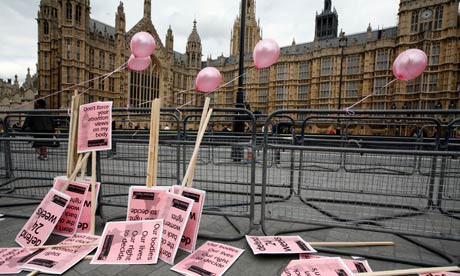
Why does it matter that an anti-abortion group that favours an abstinence-based approach to sex education has been invited to advise the government on matters of sexual health?
The Life Organisation will be one of 11 members of a new forum set up to replace the Independent Advisory Group on Sexual Health and HIV. Even the old body, set up in 2003, aimed to offer a "wide range of views from health professionals involved in all aspects of sexual health". So where's the harm in one of its members suggesting that there wouldn't be abortions if women just kept their legs closed?
Where to start? With the fact that, although the advisory body is meant to offer a range of views, the greatest weight is always given to the consensus. New policy decisions could simply get snarled up in endless debate with neither side reaching agreement on the best way forward.
Second, and most importantly, the inclusion of the Life Organisation on the panel came at the expense of the British Pregnancy Advisory Service, a not-for-profit charity that just happens to be responsible for more than a quarter of all abortions in England and Wales. What's more, Bpas provides almost two thirds of all the nation's procedures between 20 and 24 weeks of pregnancy.
By linking the two, the government appears to suggest that advising young people to just say no will lead to fewer abortions. This appears to make sense but just isn't true. In this often fraught debate it's best to use existing data. Yesterday's abortion figures revealed that the numbers of abortions for girls under 16 fell last year to 3.9 per thousand, levels last seen in 2000.
As Dr Paula Franklin of abortion provider Marie Stopes told my colleague Denis Campbell, this fall "correlates with the increased uptake of contraception".
In contrast, there is no evidence that I can find (please do send in examples if you can) where increases in abstinence education leads to a decline in abortions or unwanted pregnancies. In fact the opposite tends to happen. An increasing use of abstinence-only education programmes under the Bush administration was blamed when the teen pregnancy rate rose for the first time in more than a decade in the US (by 3% in 2006). The increase was marked by higher rates of births and abortions among girls 15-19, abortion rates that are higher per thousand than those in the UK.
Through this decision, the government is, either through mishap or design, encouraging the view that it is against abortion and believes abstinence could help reduce the number of them. It is often easy to dismiss the vagaries of Nadine Dorries, who just had her bill to increase abstinence-only education passed on a first reading. But it shouldn't be when her joint amendment with Frank Field is due to be debated in parliament soon. This amendment to the health and social care bill will make it more difficult to have an abortion by insisting that women receive advice and counselling from an organisation that does not itself carry out terminations.
Life, which provides its own pregnancy counselling services and describes itself as non-denominational, has also suggested that a "cooling off" period before abortions could play a role in reducing the number being performed.
Let's not forget David Cameron's own decision to back plans to lower the abortion limit from 24 to 20 weeks in what was seen as US-style election tactic to reach out to the religious right.
Just one member of a committee, but oh so many signs that this government is set on a course that could end in greater ignorance and more, not fewer, abortions.

